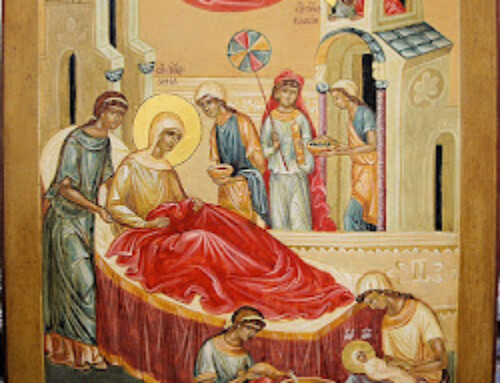Word Magazine March 2000 Page 10
JUDGE NOT LEST YOU BE JUDGED
By Very Rev. Stephen Rogers
In the Prologue from Ochrid, that wonderful collection of the lives of the saints compiled by St. Nicholai Velimirovich, we hear a marvelous account on the thirtieth day of this month. On this day, an unnamed monk is commemorated who is described as “lazy, careless, disinclined to prayer . . . .“ Hardly the description we would expect of a monk commemorated by the Church!
We are told that, when this monk lay dying, he was full of joy. His fellow monks, who knew well the lackluster efforts of their brother, were confused how one so seemingly negligent could be facing death so joyfully. They asked him how this could be and he responded: “I have seen the angels, and they showed me a page with all my many sins. I said to them: The Lord said, ‘Judge not, that ye be not judged.’ I have never judged anyone and I hope in the mercy of God, that He will not judge me.”
The dying monk ended the account by telling his brothers that the angels, upon hearing that the monk had never judged anyone, immediately tore up the long list of his sins.
The story ends by telling us that all the monks marveled at this and learned from it.
There is probably nothing to which our Lord attached a greater warning than judging our brother.
“Judge not, that you be not judged. For with what judgment you judge, you will be judged and with the same measure you use, it will be measured back to you” (Matthew 7:1-2).
St. Dorotheos of Gaza, that great spiritual teacher of the seventh century, had much to say about judging our brother: “Nothing angers God so much or strips a man so bare or carries him so effectively to ruin as condemning or despising his neighbor. There are three things here: running a man down; condemning him unjustly; and despising him.”
For St. Dorotheos, running a man down is gossiping about his behavior or lifestyle. Condemning a man is judging the state or condition of his soul. Despising, of course, is wishing his ruin.
No wonder God hates it when we judge our brother. No wonder the unnamed monk was assured of heaven. Despite his outward negligence, he never judged anyone.
St. Dorotheos tells us that those who want to be saved should never scrutinize the sins of their brother, but always their own and should then set about eliminating them. Such was the man who, when seeing his brother doing wrong, groaned, “Woe is me; him today, me tomorrow.” By this response he avoided focusing on the sin of his brother and looked at his own.
St. Dorotheos tells the story of Isaac the Theban. An angel appeared before Isaac and presented before him the soul of someone who had just died. “Here is the soul of a person you have judged,” said the angel. “Where do you order him to be put, into the Kingdom or into eternal punishment? Since you want to judge the just and the unjust, what do you command for this poor soul?”
Frightened beyond measure, Isaac spent the rest of his life praying with sighs and tears to be forgiven of this sin. He had seen the seriousness of judging another.
In this season of repentance let us learn from Isaac, St. Dorotheos and the unnamed monk and determine not to “run a man down, condemn him or despise him” as St. Dorotheos says. The more we judge, the more we gossip, the farther away from the love of God we drive ourselves.
One day, like the unnamed monk, we will be confronted with death. Will our list of sins be torn asunder? Or will we be judged by the degree to which we have judged others? Like Isaac the Theban, let us tremble at the thought of the consequences of judging others and dedicate the remaining time of our lives to repenting of and avoiding this most grievous of sins.
NO gossiping
NO condemning
NO despising

